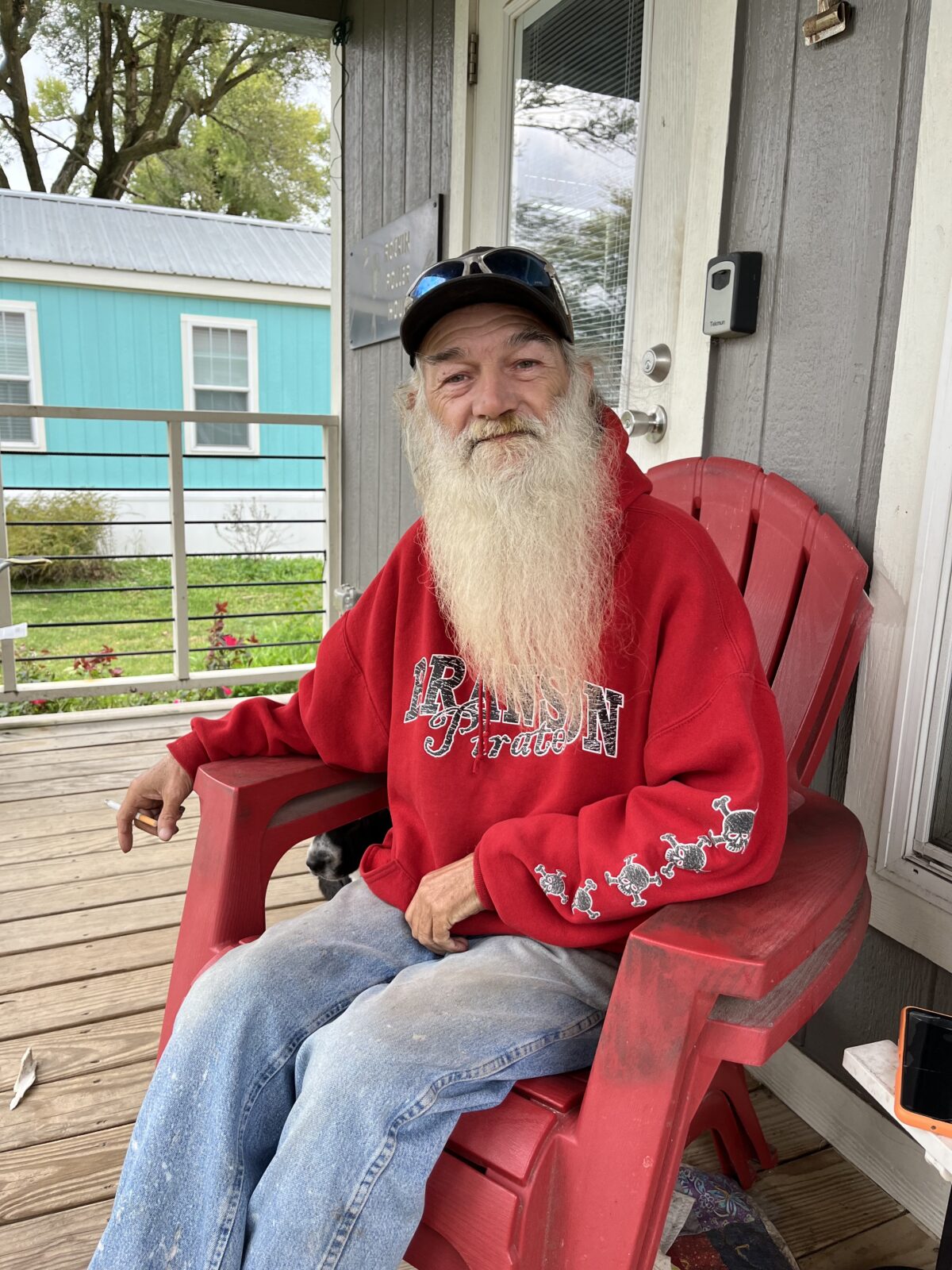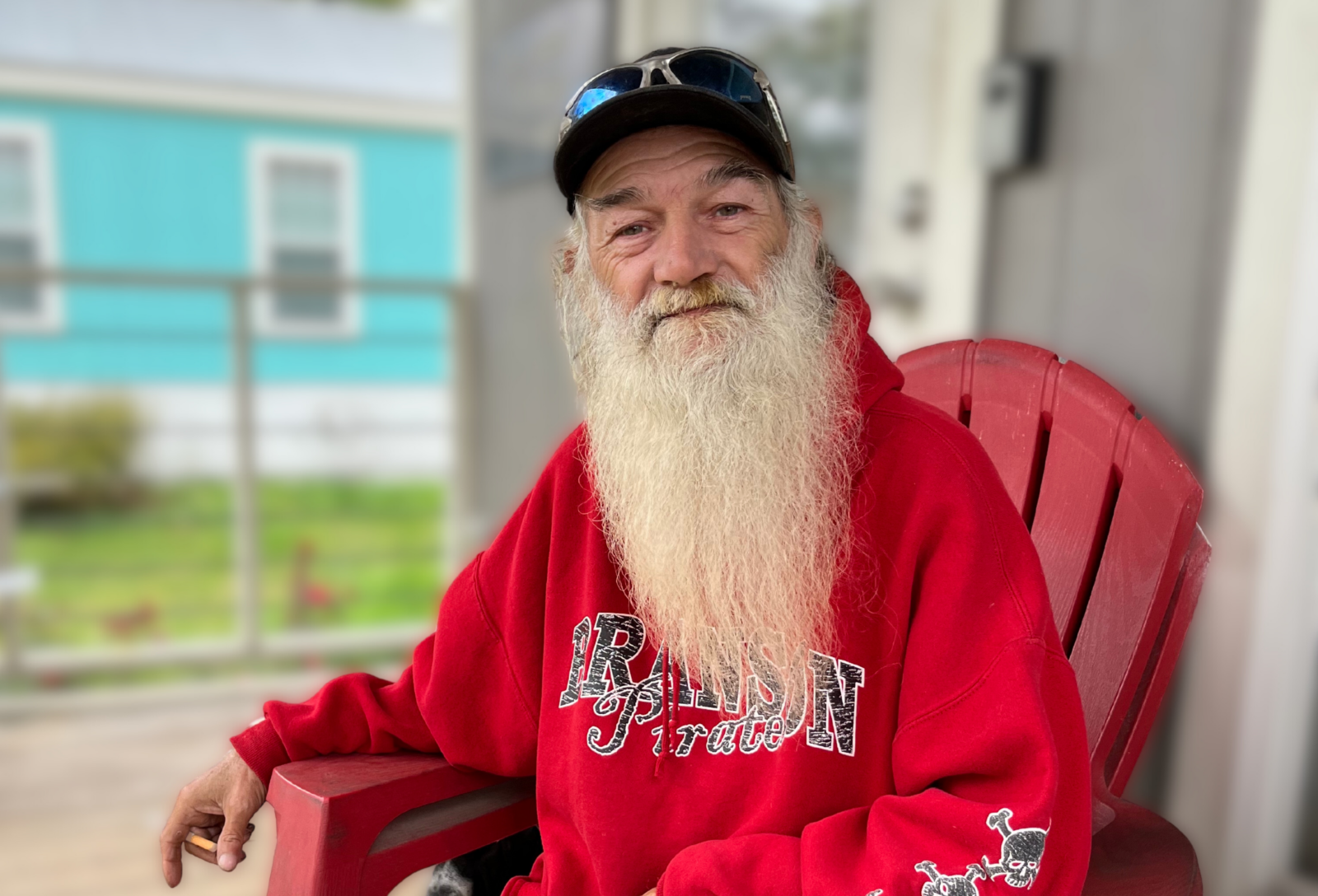One of Eden Village’s most colorful residents is white-bearded Gil Rife Jr, 65. Rife, in 3W, said he served as a Marine sharpshooter in Afghanistan in 1989. (Marine Corps University says Marines went into combat in Afghanistan in October 2001.) Five years ago Rife moved into Eden Village after being homeless for three years.

Rife said he’s the oldest of fifteen children. When I said, “that’s a lot of children,” he said his parents were alcoholics and “didn’t believe in watching TV,” and the other fourteen are all dead. So is Gilbert Rife Sr., who Rife said had gone to the state penitentiary for child molestation. Legal records do show that Rife Sr. a quarter-century ago pleaded “no contest” to rape.
Rife Jr. is an Eden Village tiny home “good neighbor,” according to those who live close to him. Others are not good. Rife has construction experience and helps to repair tiny homes that housed residents who relapsed into their addictions. He pointed to “three houses empty because of meth,” and said one addict “left holes in every wall, busted cabinets.”
The official story about Eden Village goes like this: “Most residents who live in the Village are individuals who due to their mental health, physical health, and other extenuating circumstances, are incapable of ‘graduating’ from a program and gaining full time stable independence. Residents may live at the Village as long as they are a good neighbor to the rest of the Village community.”
But “good neighbor” is a stretchable definition. For example, neighbors repeatedly complained about one resident who often argued with them, played very loud music, and let his dog run off leash. Every tiny house gets a cleaning inspection once per month: this resident had five piles of dog poop in this living room. He’s still a resident.
What does it take to be evicted? One resident who regularly yelled, cussed, used racial epithets, and seemed to hate others and himself, also had a dirty house with lots of electrical cords. He’s now an ex-resident. So is another man after his home inspection revealed not only piles of dirt and other fly favorites, but a syringe and needles.
“When to evict” is an art, not a science. Eden Village residents in October were talking about Ray, evicted from Eden Village after repeated drug violations. Ray reportedly overdosed and died three days before I arrived. Rife, who said Ray was off drugs and going to anti-drug meetings three times a week, wondered, “What made Ray go back to it?”
I’m full of admiration for Nate and Kelbi Schlueter, who with a tiny staff manage Eden Village’s population — 25 complicated individuals, all of whom have had hard lives. Kelbi mourned for Ray: “Hard when you watch them do well and they just relapse out of the blue.” In October, one resident high on drugs was yelling and swearing at others, but Kelbi said telling him to leave “would be sending him back to the streets just as winter’s coming.”
The Schlueters have two children, ages 16 and 21. Nate, 43, grew up in Missouri and owned a home security company hurt by the 2008 recession. The Schlueters moved to Austin, where Nate encountered the unhoused. At first he rolled down his window and said hi. Then he moved on to handing out water and gift cards: “I did that with kids in the car, not when they weren’t there, and I felt like a hypocrite.”
Nate decided to do more. As I noted last week, he worked at Austin’s Community First! Village, returned to Springfield in 2016, and with the Browns opened Eden Village in 2018 and 2019. He now has a wary expression like Russell Crowe’s in Gladiator, and like the movie character has left illusions behind: “It’s fallacious to think that if I get someone in a home for 12 or 24 months, I can repair him. Jesus walked through crowds of people and only some people got healed.”
Nate has learned this: “Some people say for every year on the streets, it takes a month of normal living to recover. That’s not true. For some people, there’s no healing.” Kelbi Says Eden’s residents “come here exhausted and weary,” and she has to fight her own weariness: “God uses them in my life to teach me how to love a group of people that might love me today and hate me tomorrow. One day they’re great, next day they cuss at me. It’s such a journey.”

